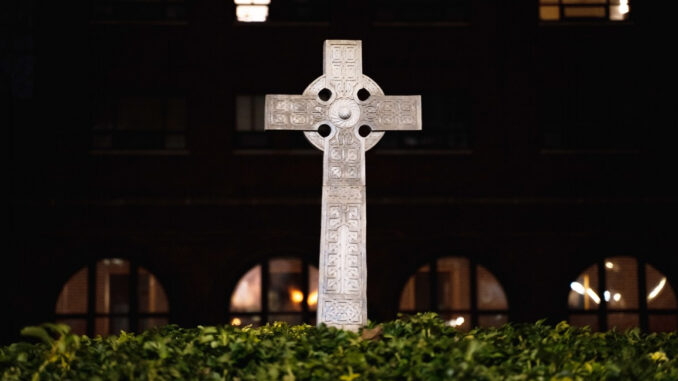
Zoe Stratos | Staff Writer
03/11/2021
With Duquesne’s recent approval to begin distributing the COVID-19 vaccine, questions of which vaccine the university will receive have arisen. However, given the vaccines’ ties to abortion and the university’s Catholic mission, many faithful question the morality of this scientific breakthrough, including the Diocese of Pittsburgh.
In several instances across the country, including in the Diocese of Pittsburgh, Catholic bishops — who do not have infallibility on matters of faith and morals, according to Catholic teaching — urged the faithful to “avoid receiving” the recently approved Johnson & Johnson vaccine due to production containing cells cultivated from a line of cells from aborted fetuses.
Released on March 2, the United States Council of Catholic Bishops (USCCB) said in a statement that “The approval of Johnson & Johnson’s COVID-19 vaccine for use in the United States again raises questions about the moral permissibility of using vaccines developed, tested, and/or produced with the help of abortion-derived cell lines.”
However, according to the USCCB, Catholics are encouraged to receive any of the approved vaccines.
“In view of the gravity of the current pandemic and the lack of availability of alternative vaccines, the reasons to accept the new COVID-19 vaccines from Pfizer and Moderna are sufficiently serious to justify their use, despite their remote connection to morally compromised cell lines. In addition, receiving the COVID-19 vaccine ought to be understood as an act of charity toward the other members of our community. In this way, being vaccinated safely against COVID-19 should be considered an act of love of our neighbor and part of our moral responsibility for the common good.”
The theme of the “common good” continued as the Johnson & Johnson vaccine was released, and a statement from the Pennsylvania Catholic Conference released on March 4 reiterates this idea: “Our position has never changed, nor has that of the U.S. Conference of Catholic Bishops, which said, ‘While we should continue to insist that pharmaceutical companies stop using abortion-derived cell lines, given the world-wide suffering that this pandemic is causing, we affirm again that being vaccinated can be an act of charity that serves the common good.’ In essence, we recognize that at this time individuals are not given a choice of which vaccine to receive and that this should not prevent Catholics from getting vaccinated as soon as possible.”
The Rev. Bill Christy, director of campus ministry and university chaplain, believes that media coverage of the issue — focusing on the several dioceses across the country that urged parishioners to avoid the Johnson & Johnson vaccine — was misleading.
“I think that by playing up the possibility of a controversy, the media was irresponsible because it’s risking lives,” he said. “You had to read through the whole headline to get to the one qualifier. I would just hate to think of someone who was trying to protect themselves and ultimately canceled their vaccine. That would’ve been horrible. It’s much better to be clearer in headlines. Some people only go by headlines.”
As a Spiritan campus, Duquesne explains in their mission statement that they are highly concerned with moral and spiritual values, but Christy and the Campus Ministry office assure students that no matter which vaccine is offered, it is acceptable to receive.
Although not used in the production of the vaccine, the cell lines of aborted fetuses were used in the testing of the Moderna and Pfizer vaccines, which makes them morally imperfect, as well, according to the church.
“We want to make sure that everyone knows that the clear moral imperative is to receive the first vaccine available to them,” Christy said. “In the most ideal world, you have a perfectly ethically sourced vaccine, but we live in this imperfect world. If an untainted vaccine were available, you would choose that, but you have an obligation in the absence of the morally superior option to receive the first available.”
To make sure students are aware, Christy and the rest of Campus Ministry plan to use their website, social media and gatherings to preach that any vaccine the university is given is acceptable to receive, and faithful students themselves have been joining in on the conversation.
“I’m a nondenominational Christian, which is a little bit different,” said freshman Ashley Parry. “But through this whole COVID thing, the main thing is to love your neighbor and look out for the people around you. Whether or not you believe in masks or vaccines, you should help yourself and your neighbor. I don’t want to get the vaccine to help those who need it get it before me, but also want to get it to protect others. No matter what you choose, you love everyone regardless.”
As an extra step, however, the university has requested to distribute the Moderna vaccine rather than the Johnson & Johnson and Pfizer vaccines, but still do not know which one they will be receiving officially.
“The COVID-19 pandemic has caused disease-related suffering globally at a massively historic scale,” said Vice President of Marketing and Communications, Gabe Welsch. “World-wide mobilization has been required, sustained over more than a year, even to begin to control the damage. For that reason, it is a moral imperative to seek vaccination in order to protect personal health and to alleviate the global suffering the pandemic has caused. The United States Conference of Catholic Bishops has supported individuals getting vaccinated, including using the Johnson & Johnson vaccine.”



